 The Australian and New Zealand Association of Neurologists (ANZAN) and the Neurological Society of Thailand together with the Chinese Neurological Society have honored me by nominating me for this important position.
The Australian and New Zealand Association of Neurologists (ANZAN) and the Neurological Society of Thailand together with the Chinese Neurological Society have honored me by nominating me for this important position.
My association with the WFN began as president of the ANZAN when, at the London World Congress of Neurology (WCN) in 2001, I presented the successful bid to host the XVIII WCN in Sydney in 2005. In 2001, I was also elected as a WFN trustee and served two terms. As president of the 2005 World Congress of Neurology in Sydney, I was proud of its educational, social and financial success.
I chaired the WFN Fundraising Committee subsequently, served as a member of the Membership Committee, which I now chair, the Publication and Website Committee the editorial board of World Neurology, the Task and Advisory Force for Neurology in Africa, the Asia initiative and the World Congress Supervisory Committee. During this time, I have met and worked with many leading national and international figures associated with the WFN and have come to appreciate the contribution made by them and the advantages the WFN offers as a global organization.
Reasons for Candidacy
For 12 years, I have observed the WFN expand its activities and modernize its organization to fulfill the role as a global federation and embark on sustained endeavors in education and advocacy of which there have been some notable examples. The first is the Africa initiative, which aims to improve the accessibility to and quality of neurological care for all Africans, especially those in sub-Saharan Africa. The second is the Asia initiative, which together with regional assistance of ANZAN and drive from its current executive and membership, has seen the AOAN move toward self-sufficiency and to have confidence to hold biennial congresses. The WHO also has recognized the growth and standing of the WFN in a number of areas.
The WFN continues to face challenges to its goal of fostering quality neurology and brain health worldwide.
Foremost among these are:
• To maintain and grow sustainable funding for the WFN,
• To protect and grow the WFN visibility and accessibility and
• To promote and sponsor initiatives that can “leverage” growth in neurological in regions of need such as Africa, Central Asia, parts of Eastern Europe and Southeast Asia.
In these difficult political and financial times, it is the internal strength of the WFN that will determine its ability to meet these challenges. Through its structure based on inclusivity and a leadership that recognizes the need to adapt, the WFN has this internal strength. The electronic reformatting of World Neurology, the modernization of the website and the move to a biennial World Congress rotating successively through the WFN regional organizations are evidence of this.
This adaptive process needs to continue in order to address the first two of the challenges referred to above, which are in turn critical to the third.
The development of a constantly growing and maintained e-mail registry of individual neurologists will provide a modern communication platform that should facilitate rapid interaction with neurologists directly or through their national and regional organizations building the strength of the WFN. Improved communication will complement the earlier modernizing initiatives and lead to a greater sense of commitment, contribution and benefit from WFN membership. In 2009, as chair of the Membership Committee, I was tasked to address the issues of dues and weighted voting based on size of membership and dues. The resulting “Fairness in the WFN” paper addressed mainly the value of contribution. Now, I believe we need to address the benefit to members so that all members should feel they are both contributing to and benefiting from WFN membership. Direct and timely communication will undoubtedly assist our progress to a more cohesive and effective global organization.
Goals
• To protect and grow the visibility of the WFN brand
• To continue to modernize WFN communication and processes
• To reach more areas in need of neurological care and expertise and to review and expand existing regional initiatives
• To reach, communicate and partner with others to assist the WFN achieve its goals
• To ensure the optimum balance of contribution and benefit for members of the WFN
• For the WFN to be the point of first call for national member societies and individuals requiring assistance on educational issues.
Personal Qualities and Experience
The role of first vice president requires a balance of experience, energy and teamwork. I believe I will contribute effectively to the stable growth of the WFN, the fulfillment of its mission and the achievement of the stated goals. Listed are some of the positions that I have held, or currently occupy, supporting my candidacy.
General
1988-1996, 2001-present
Head, Department of Neurology, Sir Charles Gairdner Hospital, Perth, Australia
1992-2000
President and Councilor, ANZAN
1996-2004
Neurology Editor, Journal of Internal Medicine
1998-present
Chair, Multiple Sclerosis Australia Research Management Council
2003-present
Editor (Asia and Pacific) of Multiple Sclerosis Journal
2007-present
Vice President, Pan-Asian Committee for the Treatment, Research and Investigation of Multiple Sclerosis (PACTRIMS)
2008-2012
Vice President, Asian and Oceanian Association of Neurologists
2012
Western Australian of the Year — Business and Professions
WFN
2001-2006
Elected Trustee of the World Federation of Neurology
2004-2008
WFN Director of the World Neurological Foundation
2005
President, XVIII World Congress of Neurology in Sydney, Australia
2005-2009
Chair Fundraising Committee
2009-present
Chair Membership Committee
2009-present
Member Congress Supervisory Committee
